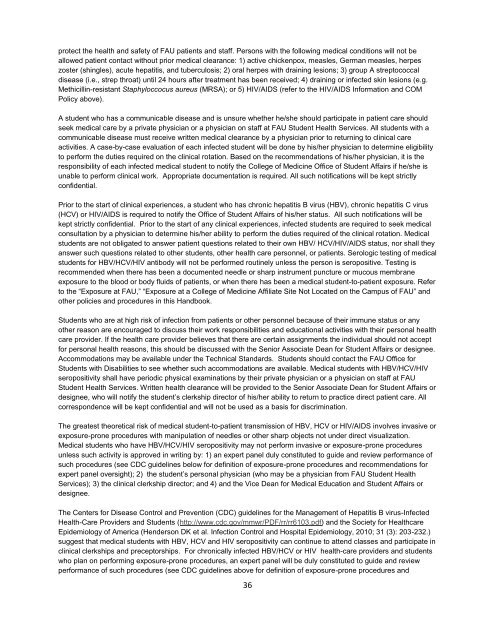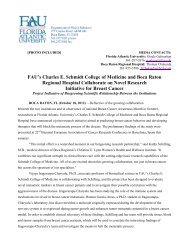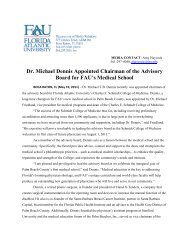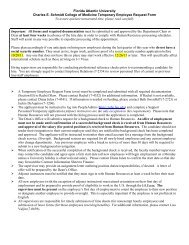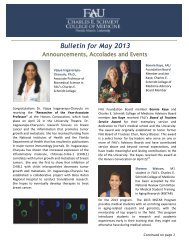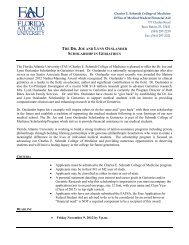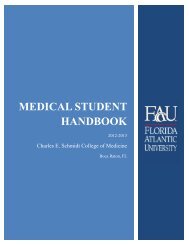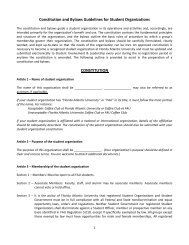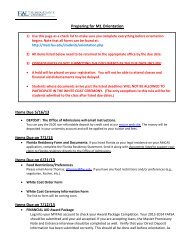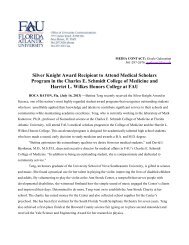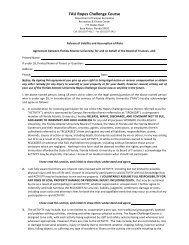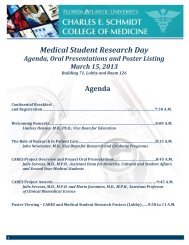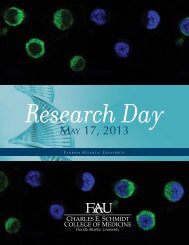Student Handbook - College of Medicine - Florida Atlantic University
Student Handbook - College of Medicine - Florida Atlantic University
Student Handbook - College of Medicine - Florida Atlantic University
You also want an ePaper? Increase the reach of your titles
YUMPU automatically turns print PDFs into web optimized ePapers that Google loves.
N L H F E D C Aprotect the health and safety <strong>of</strong> FAU patients and staff. Persons with the following medical conditions will not beallowed patient contact without prior medical clearance: 1) active chickenpox, measles, German measles, herpeszoster (shingles), acute hepatitis, and tuberculosis; 2) oral herpes with draining lesions; 3) group A streptococcaldisease (i.e., strep throat) until 24 hours after treatment has been received; 4) draining or infected skin lesions (e.g.Methicillin-resistant Staphyloccocus aureus (MRSA); or 5) HIV/AIDS (refer to the HIV/AIDS Information and COMPolicy above).A student who has a communicable disease and is unsure whether he/she should participate in patient care shouldseek medical care by a private physician or a physician on staff at FAU <strong>Student</strong> Health Services. All students with acommunicable disease must receive written medical clearance by a physician prior to returning to clinical careactivities. A case-by-case evaluation <strong>of</strong> each infected student will be done by his/her physician to determine eligibilityto perform the duties required on the clinical rotation. Based on the recommendations <strong>of</strong> his/her physician, it is theresponsibility <strong>of</strong> each infected medical student to notify the <strong>College</strong> <strong>of</strong> <strong>Medicine</strong> Office <strong>of</strong> <strong>Student</strong> Affairs if he/she isunable to perform clinical work. Appropriate documentation is required. All such notifications will be kept strictlyconfidential.Prior to the start <strong>of</strong> clinical experiences, a student who has chronic hepatitis B virus (HBV), chronic hepatitis C virus(HCV) or HIV/AIDS is required to notify the Office <strong>of</strong> <strong>Student</strong> Affairs <strong>of</strong> his/her status. All such notifications will bekept strictly confidential. Prior to the start <strong>of</strong> any clinical experiences, infected students are required to seek medicalconsultation by a physician to determine his/her ability to perform the duties required <strong>of</strong> the clinical rotation. Medicalstudents are not obligated to answer patient questions related to their own HBV/ HCV/HIV/AIDS status, nor shall theyanswer such questions related to other students, other health care personnel, or patients. Serologic testing <strong>of</strong> medicalstudents for HBV/HCV/HIV antibody will not be performed routinely unless the person is seropositive. Testing isrecommended when there has been a documented needle or sharp instrument puncture or mucous membraneexposure to the blood or body fluids <strong>of</strong> patients, or when there has been a medical student-to-patient exposure. Referto the “Exposure at FAU,” “Exposure at a <strong>College</strong> <strong>of</strong> <strong>Medicine</strong> Affiliate Site Not Located on the Campus <strong>of</strong> FAU” andother policies and procedures in this <strong>Handbook</strong>.<strong>Student</strong>s who are at high risk <strong>of</strong> infection from patients or other personnel because <strong>of</strong> their immune status or anyother reason are encouraged to discuss their work responsibilities and educational activities with their personal healthcare provider. If the health care provider believes that there are certain assignments the individual should not acceptfor personal health reasons, this should be discussed with the Senior Associate Dean for <strong>Student</strong> Affairs or designee.Accommodations may be available under the Technical Standards. <strong>Student</strong>s should contact the FAU Office for<strong>Student</strong>s with Disabilities to see whether such accommodations are available. Medical students with HBV/HCV/HIVseropositivity shall have periodic physical examinations by their private physician or a physician on staff at FAU<strong>Student</strong> Health Services. Written health clearance will be provided to the Senior Associate Dean for <strong>Student</strong> Affairs ordesignee, who will notify the student’s clerkship director <strong>of</strong> his/her ability to return to practice direct patient care. Allcorrespondence will be kept confidential and will not be used as a basis for discrimination.The greatest theoretical risk <strong>of</strong> medical student-to-patient transmission <strong>of</strong> HBV, HCV or HIV/AIDS involves invasive orexposure-prone procedures with manipulation <strong>of</strong> needles or other sharp objects not under direct visualization.Medical students who have HBV/HCV/HIV seropositivity may not perform invasive or exposure-prone proceduresunless such activity is approved in writing by: 1) an expert panel duly constituted to guide and review performance <strong>of</strong>such procedures (see CDC guidelines below for definition <strong>of</strong> exposure-prone procedures and recommendations forexpert panel oversight); 2) the student’s personal physician (who may be a physician from FAU <strong>Student</strong> HealthServices); 3) the clinical clerkship director; and 4) and the Vice Dean for Medical Education and <strong>Student</strong> Affairs ordesignee.The Centers for Disease Control and Prevention (CDC) guidelines for the Management <strong>of</strong> Hepatitis B virus-InfectedHealth-Care Providers and <strong>Student</strong>s (http://www.cdc.gov/mmwr/PDF/rr/rr6103.pdf) and the Society for HealthcareEpidemiology <strong>of</strong> America (Henderson DK et al. Infection Control and Hospital Epidemiology, 2010; 31 (3): 203-232.)suggest that medical students with HBV, HCV and HIV seropositivity can continue to attend classes and participate inclinical clerkships and preceptorships. For chronically infected HBV/HCV or HIV health-care providers and studentswho plan on performing exposure-prone procedures, an expert panel will be duly constituted to guide and reviewperformance <strong>of</strong> such procedures (see CDC guidelines above for definition <strong>of</strong> exposure-prone procedures and36


